On Tuesday 5 December, we spent the day with the Gatwick Detainee Welfare Group (GDWG) to learn more about what they do and to shadow an advice drop-in at Brook House Immigration Detention Centre.
This was part of our plan to strengthen our resources on detention, destitution and exploitation for our community in the face of horrific initiatives like the so-called Illegal Migration Act.
Since 1995, GDWG, a charity, has provided support to and solidarity with those detained at Brook House and Tinsley House near Gatwick Airport. They provide advocacy and moral support, practical support, and a source of community and solidarity for people who are detained, and upon their release.
GDWG’s work
GDWG has a number of initiatives to provide this support and solidarity.
Visits are where GWDG began its work, decades ago.Though they now have a small core staff team, they also coordinate about 30-40 volunteers who contribute to different activities, such as:
- Sorting through clothes donations and dropping them to the people who need them in the centres.
- Visiting those in detention so they have a friendly face to speak with about anything.
- Visiting people who have been released from detention and who are then placed in asylum accommodation in surrounding areas.
- Joining in on the GDWG ‘Walk With Us’ project which hosts countryside walks for people released from detention along with community members and volunteers.
Volunteers also help GWDG to deliver practical support in the form of delivering requested clothing, necessities (like backpacks), books, shoes, supermarket vouchers, and phone credit to those in detention and those who have been released.
The GWDG team provides educational opportunities for the local and wider community. For instance, the Refugee Tales project, which is an outreach initiative that shares the stories of those who have been through the system in order to call for an end to indefinite detention. GDWG also delivers talks in local schools to raise awareness about detention.
Here is one of their educational props:
We were delighted to spot our Asylum Navigation Board game (now available online) in their office!
The bulk of GDWG’s casework consists of filling in asylum support accommodation forms, supporting people through the Detention Duty Advice (DDA) scheme, and helping people find or liaise with their legal representatives (for immigration, criminal, family, or community law issues) and Migrant Help. The need and requests for casework support from GWDG have increased significantly in the last 3 years. It is interesting and important to note that, despite findings of inadmissibility, some of those supported by GDWG have been released from detention – which further proves that the Inadmissibility Rules are defunct. You can read more about them in our Toolkit page here.
In sum, the work of GDWG provides a lifeline to those detained at Brook and Tinsley House, and those who have been released from detention and dispersed across the country – because we all know that the struggle does not end with being released from detention. GWDG provides a foundation of radical solidarity and community support.
Brook House
It is no secret that Brook House Immigration Detention Centre has been the subject of much scrutiny in recent months. You can read more about the shocking findings of the public inquiry here.
Immigration detention is extremely distressing and inhumane, and – to be clear – at Right to Remain we believe that no one should be put in immigration detention. The dangers and difficulties of this reality are highlighted by the findings of the inquiry.
However, as recently as November 2023, a man who was detained at Brook House tragically took his own life – which further shows how challenging and inappropriate immigration detention is, and how not much at all has improved since the inquiry report was published in September 2023.
Detention is an extremely isolating experience, and in the UK, people can be detained in immigration detention indefinitely (this means with no time limit). The ‘idea’ behind detention is that removal from the UK will soon follow – but this is often not the case for various reasons. So, many of those at Brook House have been there for months, and although visits from friends and family are permitted, this is not always a possibility. For instance, in order to visit someone at or enter Brook House, you must have proof of address and an ID document. For many friends and family members of those detained, this is an obstacle. Also, getting to the detention centres at Gatwick is expensive! For other people who are detained, they do not want to see family or friends because it is too hard or upsetting. And for others, they do not have anyone who can visit. That is why the visits carried out by GDWG volunteers are so important – they create friendships and support in an environment that limits this kind of connection.
For all intents and purposes, Brook House operates like a prison. There are guards, there are cells, there are bolted doors and security checks, there are chains, and those detained have very little freedom of movement. Those detained can be categorised as “high risk”, and therefore further limited from participating in activities or paid opportunities to do some tasks within the centre. It has a capacity for approximately 400 people to be detained. People typically stay in a room for two people, unless their healthcare plan shows that they should have a room of their own (for instance, if they struggle with sleep trauma).
There is a Legal Visits corridor which has rooms for visits from lawyers, caseworkers, the GDWG, and also where virtual, video-link bail hearings are held.
Shadowing the GDWG drop-in allowed us to listen in to the key legal and personal issues that are arising for people in Brook House and detention more generally – for instance, the revocation of immigration status, pursuing human rights claims, asylum appeals, applications for asylum support accommodation, voluntary returns, and disputing an unwarranted criminal conviction.
Struggles with mental health are rife within the centre, because of what people have been through and because of the difficult existence they are subjected to within the centre. Some people have lawyers, some people do not. The ‘E’ wing is for people who have ‘complex’ (for instance, mental health) needs, and those who are separated from the rest of the detention population.
A Rule 35 assessment can be carried out for those who are “particularly vulnerable to harm in detention”. You can read more about this in our Toolkit here.
What you can do
In sum, the work of GDWG provides a lifeline to those detained at Brook and Tinsley House, and those who have been released from detention and dispersed across the country – because we all know that the struggle does not end with being released from detention. GWDG provides a foundation of radical solidarity and community support.
You can support their work and join the struggle against detention in a number of ways. For instance, you can join the ranks of their volunteers.
Your donations would also be greatly appreciated. Monetary donations can be made here.
Donations of clothing and other key, clean items are always appreciated too. For instance –
Secondhand/new
- Trainers for men in sizes 6-12
- Comfy T-Shirts
- Jogging trousers (sizes M-XL)
- Jackets and winter coats (sizes M-XL)
- Suitcases and backpacks that are in good condition
- Gym shorts and tops
New
- Underwear (sizes M-XL)
- Socks (sizes M-XL)
Anyone can contact GDWG to let them know that they have donations available and take them to a meeting point in London, or they can be posted or dropped to their office. Contact GDWG here for further details.
Thank you to GDWG for letting us tag along, and for sharing so much wisdom. It is an honour to be fighting for justice for all together.






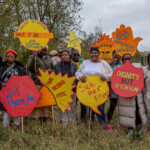
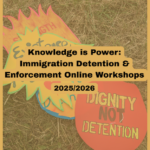
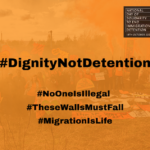

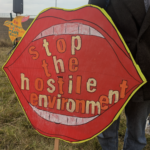



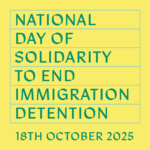
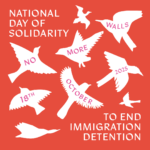
Discussion: